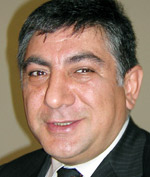The only MP that voted against this draft was the former director of “Grand Candy” JSC, Samvel Sahakyan. As for the other MPs that had certain interests in different business fields, they didn’t vote at all. The only ones among them to vote were Khachatour Sukiasyan and Gurgen Arsenyan, who voted for this draft.
According to the president’s former advisor on corruption issues, Bagrat Esayan, this law is very important for discovering cases of hidden income, as well as registering the property of officials, which they register under the name of their relatives with the purpose of keeping it confidential. The deputy head of the RA taxation services, Armen Alaverdyan thinks the same about the mentioned draft law and after the failure he said, “They speak about fighting against corruption, about transparency and other relevant procedures, but now they managed to make this voting a failure, which could reflect the incomes of people that get more than 500.000 dram per month”. The parliament didn’t adopt the law draft on instituting legal proceedings against business participants avoiding to pay taxes either, and the Government had accepted all the recommendations of NA deputies, “We did our best to set less penalties and made it as minimum as we could. The deputies who didn’t vote last time didn’t even vote this time either after these changes. I don’t know why. So why do they speak about anti-corruption programs and other relevant things? Can they fight against corruption this way?” said Armen Alaverdyan surprisingly. The National Unity, Rule of Law and People’s Deputy faction didn’t vote either and later tried to explain this by saying that they did this for the sake of the people. For instance, Rule of Law member Hovhannes Margaryan said that he didn’t understand how a farmer can register his income if he doesn’t have any. As for A. Alaverdyan, he thinks that such explanations are baseless. “They all blame farmers and villagers. There is no villager that has an income increasing 500.000 dram a month. So, everyone must know who will benefit from the adoption of this law”, said Armen Alaverdyan and added that these deputies don’t think about the interests of citizens, but about the interests of the people that get more than 500.000 dram a month and don’t want to register their income. As for the Rule of Law members, who try to explain everything under slogans about people, they didn’t vote either, and A. Alaverdyan says that he was very surprised to hear their explanation for this, saying that they are oppositionists now and don’t want to vote. The president of SIL group, MP Khachatour Sukisasyan was talking to deputies after the session in the NA building and was trying to explain to them that this bill was good and people would benefit from it. We asked him whether this law would discover cases of corruption and would work well or not. Answering to our question Mr. Sukiasyan said, “I don’t think that this is the only shortcoming that doesn’t prevent corruption, I think there are a lot of shortcomings that create a ground for corruption. And generally there are many things supporting corruption. But this doesn’t concern that issue at all. I think it is good to register the incomes and expenditures of physical persons and I want this institution to be formed in Armenia, because I think that as result of this institution other institutions will start working too. I think it will make people responsible for what they do and be held accountable to the society”. In response to our question as to why the other businessmen MPs voted against that draft Mr. Sukiasyan said, “First of all let me note that I am not a businessman, I used to be a businessman, due to which I was elected in the parliament, besides that The Constitution doesn’t allow doing business while being a NA deputy. But please note that I want this law to be brought up because this doesn’t concern us, but the generations, and I want them to be more secure than we are now. I think it will be better for us to have a good culture of relations between the state and citizens. This system must work well. We can’t have Euro standards if we don’t work these shortcomings out and don’t improve our legal field”. In response to our question concerning if this law was adopted but didn’t work, Mr. Sukiasyan said, “I think it will be very bad, but if you want to know the truth, please note that this is a “training” period and probation. In other words, people will be under probation during a couple of years, and then the relevant bodies will institute legal proceedings against them. Currently these institutions are in the formation phase, and the time will come when these issues will be more important. We need time to lead this process to a high level. Now we are trying to solve the problem of this institutional chain, I mean the system, which will have to work later”.
P.S. It is quite possible that this bill may be presented to the National Assembly for discussion during the coming sittings.

